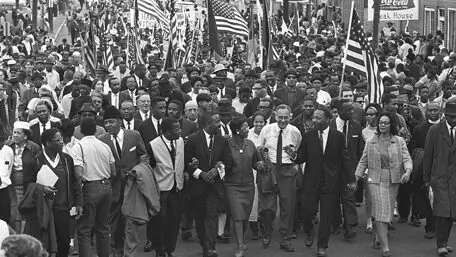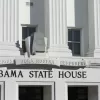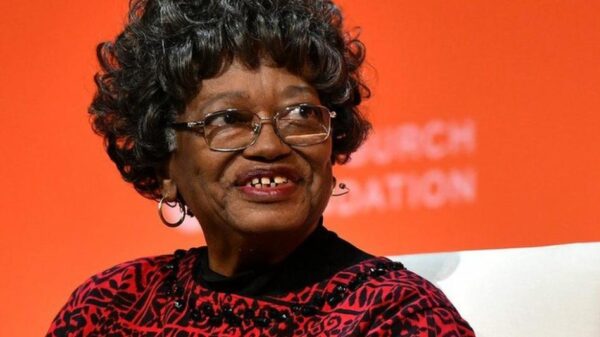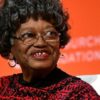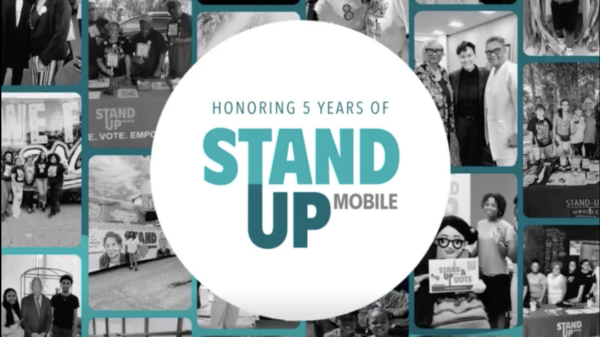A panel convened by the Brennan Center for Justice on Tuesday analyzed the history and future of the Voting Rights Act in celebration of the law’s 60th anniversary.
Panelists consisted of Representative Nikema Willians, D-Georgia; Kanawha County West Virginia County Commissioner and former state Secretary of State Natalie Tennant; Harvard University Kennedy School of Government professor Dr. Alexander Keyssar; Director of the Brennan Center’s Voting Rights Program Sean Morales-Doyle and Native American Rights Fund Staff Attorney Lenny Powell.
The panel’s discussion of the legacy of the Voting Rights Act largely centered around the lasting effects of the U.S. Supreme Court’s decision in Shelby v. Holder.
The case out of Shelby County, Alabama received a verdict from the court, which struck down the Voting Rights Act’s federal preclearance provision for localities with a history of voter or racial discrimination to change laws regulating voting.
“A little over a decade since the Shelby County decision, states passed more than 100 restrictive voting laws, and every one of those laws has potentially discriminatory effects, has restrictive effects,” said Morales-Doyle.
The Brennan Center official cited research conducted by his organization regarding the case’s lasting impacts on worsening racial disparities in voter turnout.
“What our research shows is that, sadly, across the country, the racial turnout gap, the gap between white voters and voters of color, has been growing since the Shelby County decision, but more specifically, in those jurisdictions that were previously covered by pre-clearance, that racial turnout gap is growing twice as fast as in the rest of the country,” he said.
Williams, who currently sits in the congressional seat formerly occupied by late civil rights advocate Representative John Lewis, D-Georgia, argued for further congressional and public support for legislation to reinforce the Voting Rights Act’s protections, following the court’s decision in Shelby v. Holder.
Williams called for a reassessment of how contemporary instances of racial gerrymandering and judicial limits placed on the Voting Rights Act continue to threaten minorities’ right to vote.
“We need to look at this in a modern lens to know that just because they’re not making people count jellybeans in a jar or you might not be paying the traditional poll tax, a lot of these tactics seek the same results that they were seeking by forcing Black people to count jellybeans in a jar,” she said. “Just because the tactics look different does not mean that the end results are not the same.”
The representative went on to endorse the John Lewis Voting Rights Advancement Act, filed in the U.S. House of Representatives in 2025 by Representative Terri Sewell, D-Alabama.
The act, which has been filed annually by Sewell since 2013, would reinstate and apply a new framework for enforcing preclearance of localities with a history of voter suppression or racial discrimination.
Williams also pointed to a voting rights package she has pushed, including ten pieces of legislation intended to expand the Voting Rights Act’s protections.
“We should make sure that everyone, regardless of their ZIP code and or where they live in this country, has access to the ballot,” she said. “And that’s what this legislative package that will make sure that voting is accessible to everyone, helping in long lines, easing language barriers while voting, and making sure people don’t have to decide between going to work or voting.”
Powell discussed the Voting Rights Act’s importance in promoting political participation, as well as his organization’s work to advocate for its continued enforcement.
“Section 2, which prohibits racial discrimination in voting, has led to roughly 1500 lawsuits at least since the early 1980s largely brought by private parties, by some estimates, over 90 percent, and those suits have been successful two-thirds of the time,” Powell said. “So that’s hundreds upon hundreds of instances of racial discrimination that have been thwarted thanks to the Voting Rights Act.”
Powell went on to describe the act’s importance to improving political participation and representation among Native Americans.
“The Voting Rights Act is a law that, although has been was primarily motivated in the first instance by discrimination against Black voters in the South, is important in all sorts of different areas of the country, including areas of the country where Native Americans tend to live,” he said.
“One thing that the Voting Rights Act does is ensure protections for language minority groups. That has been really important in Alaska, for instance, where there are a lot of Native languages spoken in very isolated, Native Alaskan communities,” Powell continued.
Powell emphasized the importance of this statute, which ensures multilingual ballots and election materials in covered jurisdictions, as well as outreach and assistance for voters in their native language.
“More generally, we’ve seen much higher voter registration and turnout across Indian country because of the Voting Rights Act. The statistics, as you would suspect, are the same or similar for other groups that historically have been discriminated against in voting. We’ve seen more Native candidates elected to local and state offices, and importantly, the law continues to do a lot of critical work,” Powell added.
Discussing threats to Section 2 of the act, Keyssar pointed to a January court ruling that denied citizens of the Eighth Circuit Court the right to sue in response to alleged violations of the section.
“In effect, it’s saying only the Justice Department can bring those suits. And if you’ll forgive a political aside, I don’t think that Pam Bondi’s Justice Department is particularly interested in bringing those suits,” said the professor.
Panelists went on to discuss an ongoing court case, the Turtle Mountain Band of Chippewa Indians v. Howe, in which Powell’s organization, the Native American Rights Fund, is representing two Native voters suing the North Dakota state legislature for adopting a legislative map that allegedly dilutes the votes of the state’s Spirit Lake and Turtle Mountain reservations.
The case received a verdict from a district court that found the map to be in violation of Section 2 and ordered the drawing of a remedial map.
Powell also pointed to the Eighth Circuit Court’s ruling out of Arkansas that private individuals and organizations have no right of action to enforce Section 2, which meant the Turtle Mountain plaintiffs were forced to argue a right to sue was still present under U.S. Code Section 1983. The Eighth Circuit, however, ruled against the right to private action under that statute as well.
“Right now, everywhere else in the nation, other than the Eighth Circuit, private plaintiffs can rely on an unbroken line Supreme Court and circuit precedent to enforce the individual rights given to them by Congress and the VRA,” Powell said. “But not in the Eighth Circuit, where citizens now have fewer enforceable rights and protections against racial discrimination in voting than citizens everywhere else. That’s especially a problem for native voters, given the high percentage of Indian country located in the Eighth Circuit.”
“The current political situation illustrates that we cannot rely on the Department of Justice alone to enforce these rights,” Powell added. “That’s true in the best of times, and it’s certainly true now, when VRA enforcement at the federal level by the Department of Justice is basically nonexistent.”
The Supreme Court moved in late July to give the Turtle Mountain plaintiffs an emergency stay which keeps the current remedial map, which safeguards against the dilution of Native votes, in place.
“We think it’s likely that the Supreme Court will take the case and reverse the Eighth Circuit grievous error here,” Powell said.
Keyssar led the discussion of the history of the Voting Rights Act, in recognition of the 60th anniversary of its passage earlier this month.
“The place I would start is by looking at the subtitle of the Voting Rights Act, which almost no one ever looks at. It’s called the Voting Rights Act, but it has a subtitle, which is ‘an act to enforce the 15th Amendment,’” the professor said.
Keyssar pointed out that the Voting Rights act came nearly a century after the passage of the 15th Amendment in 1870.
“The story is not all that simple. The voting rights of African Americans were enforced while Union troops remained in the South, but when they were withdrawn, then Southern whites began campaigns, often violent and certainly widespread, to prevent African Americans from voting,” Keyssar said.
Keyssar also pointed to a 19th Century congressional push to enforce the amendment, which would have sent U.S. Marshalls into Southern states, but was narrowly defeated in the Senate by filibuster.
“In an interesting moment in 1890, Congress strongly (…) a piece of legislation called the Federal Elections Bill of 1890, also known as the large force bill,” he said. “Then for the next 60 or 70 years, Washington paid very little attention. The federal government paid very little attention to voting rights in the South and voting rights were suppressed.”
Keyssar emphasized the importance of Black veterans returning from World War II, as a key factor which helped initiate what would become the Civil Rights Movement, citing that African Americans who served their country increasingly voiced their grievances over being denied their right to vote.
The professor also highlighted the events of Bloody Sunday in Selma as a widely televised galvanizing event which helped garner wider support for the movement and voting rights protections.
“Lyndon Johnson, not many weeks later, went to Congress in what I think was the best speech of his career, and in effect, said that we had to pass the Voting Rights Act,” he said.
Keyssar went on to also emphasize the importance of international pressure in pushing Congress to act to safeguard voting rights.
“The Soviet Union was making very substantial, successful propaganda by pointing out that that America’s racial minorities were denied the right to vote,” Keyssar said. “And thus, how could the United States claim to be the beacon of democracy in this global competition for allegiance?”
The event culminated with a discussion of future and current threats to voting rights and how citizens can work against disenfranchisement.
“One of the things we have to understand is that thanks to the kind of efforts that everybody is talking about, but also thanks to changing historical circumstances, what seems impossible today might be look possible five or ten years from now,” Keyssar said. “And I think that I mean that that can be, that can be that can lead you to have nightmare scenarios, but it can also be a source of optimism and hope.”
Powell urged citizens to be vocal regarding threats to voting rights and the continued existence of racial discrimination in the U.S.
“I would stress is that racial discrimination, including racial discrimination in voting, persists, and that the Voting Rights Act remains an essential tool to combating that,” Powell said. “I think that we all need to do what we can to elevate those stories that really show the ways that the Voting Rights Act still remains essential.”
Williams similarly called for citizens to remain active in advocating for voting rights protections and continuing to advance the mission of the Civil Rights Movement.
“We talk a lot about the Civil Rights Movement, especially those of us from the South,” said Williams. “Y’all, we are living in unprecedented times, and this is our Civil Rights Movement. So, if you ever wonder what you would have done if you would have been around in the days of Congressman John Lewis and fighting to achieve the Voting Rights Act, this is your time to absolutely find out. It is time to step up.”





































